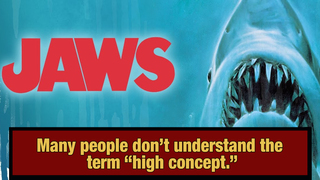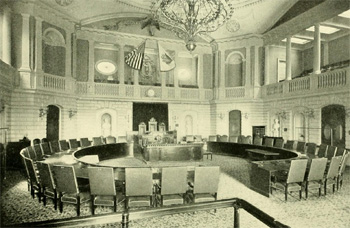5 Misunderstood Terms That Needlessly Freak Everyone Out

When you were young, teachers taught you words, and if you used them wrong, teachers corrected you. That worked well for a while, but now you're an adult. You absorb words and just kind of guess what they mean, and no one corrects you, because they're too scared of your giant muscles. But we at Cracked fear nothing and no one, so we bravely point out that you're totally wrong about what it means when someone says they ...
"Declared A State Of Emergency"
What We Think It Means:
We're screwed.
Don't Miss
Wow, the governor declared a state of emergency? This is like when that old guy in Return of the King gave up and told everyone to abandon their posts — all hope is lost! Or maybe it's like declaring martial law? All schools and businesses will shut down, naturally. And maybe we'll all be locked in our homes, Stormtroopers assuming control of all the toiletries, and soon we'll have to wipe our butts with broken glass as they hold guns to our heads.

It Actually Means:
Wrote to request central funds.
States and the federal government have emergency funds. They release these only when an emergency is in progress. In declaring a state of emergency, a mayor or governor requests/authorizes the release of this state or federal money. Emergency responders also count as emergency resources, so declaring a state of emergency permits them to enter the affected area more easily. If the emergency is a riot and you're worried about emergency responders shooting you, yeah, the news isn't great, but the emergency declaration doesn't give those guys any extra powers, and when the emergency is a natural disaster, we're generally talking about new assistance for everyone.

A "state of emergency" has nothing to do with draconian rules or extraordinary measures (not in the US at least — other countries have all kinds of ways of using the phrase). Declaring it doesn't tell us things are bad; we already knew how bad they were. Declaring is a procedural move related to resource allocation. States of emergency, incidentally, shouldn't be confused with national emergencies, which are a different concept and potentially give the president various powers. Historically, national emergencies have almost never been related to natural disasters (there was just the H1N1 outbreak and now the COVID one), and most of the time, they've been used to enact international sanctions.
Governments are indeed capable of extreme laws and operations, and they may even implement those at the same time as they declare states of emergency, but declaring a state of emergency has nothing to do with those. Which is small comfort to everyone reading this who's living under those crazy unprecedented conditions right now, but just know the next time you hear a state of emergency declared, don't think, "Shit, it's happening again!" Think, "Phew. Help is on the way."
And speaking of declaring stuff ...
"Filed For Bankruptcy"
What We Think It Means:
They're screwed.
Did you hear the Boy Scouts of America filed for bankruptcy because of all those sex abuse suits? That means they're done for. This news tells us the suits were so large that all their money is gone now. If you were rooting against the organization because you hate sex abuse, this story should bring a smile to your face. Or if you were rooting for the organization because you love maps, shed a tear and pour one out for the end of an American institution.

It Actually Means:
Received federal protections, pausing all claims against them.
Filing for bankruptcy (otherwise known as seeking chapter 11 protection) doesn't mean you're going out of business. Companies go out of business all the time without bankruptcy being an option. Rather, bankruptcy is a path companies take to stay in business. Their debts were already huge, but filing for bankruptcy halts new claims, reorganizes their debt, eliminates a whole lot of debt leaving creditors stranded, and lets the company go on. It's not exactly a get-out-of-jail-free card — that's the other misconception about how bankruptcy works — but it's a good move.

Marvel
In the specific case of the Boy Scouts' bankruptcy, all pending suits against them were suspended, and individual branches remained shielded. Victims were not happy. There is another type of bankruptcy, Chapter 7, in which all the company's assets are liquidated and it really is over for them. But when this happens, you'll probably hear the shutdown described explicitly rather than just being called "bankruptcy."
Funny thing is, we probably all know this on some level. We know people who declare bankruptcy aren't taken out back and shot, and we've heard of companies declaring bankruptcy and still being around years later. But we still instinctively associate "bankruptcy" with "the end." Probably because that's what bankruptcy means in Monopoly. Monopoly confused us about a whole lot of concepts. Bankruptcy, mortgages, get-out-of-jail-free cards, the very concept of "fun," and so on. Goddamn it, Monopoly.
"Third-World Country"
What We Think It Means:
Screwed-up country.
Oh, you stopped in Bangladesh during your last vacation? That's a surprising choice, visiting a third-world country. But then again, you were flying out from LaGuardia, and that had to suck no matter where you were flying to — that place looks like something out of the third world! Oops sorry, look at me, going on about first-world problems. Meanwhile, in the third world, they don't even have food.


It Actually Means:
Country neutral during the Cold War.
During the Cold War, the United States and its allies squared off against the USSR and its allies for years and years of geopolitical maneuvering. First-world countries are those from that first group, second-world countries are from the second group, while all remaining countries form the third world. The weird names derive from French history, and how the "third estate" was separate from royalty and the clergy. So, sure, Bangladesh would be a third-world country. But so would Ireland, Croatia, Sweden, and Finland. Suriname in South America is a first-world country, while neighboring Guyana is third-world. Much of Africa is third-world, but Zimbabwe is first-world, while Somalia is second-world.

Now, like all words, "third world" can change its meaning if enough people misuse it, so if you think someone's using the phrase to mean "poor country," you're probably right. But there is no correct way to refer to poor countries as the third world — there is no official list of third-world countries, or first-world countries for that matter. And not everyone in developing countries take kindly to you placing them in some metaphorical lowest tier (third tier being below a nonexistent, hypothetical second tier).
You can rank all nations by their per-capita income or whatever, but as soon as you demand discrete categories, you're setting yourself up for saying something dumb. And what tier do you put those wealthy Middle Eastern countries with huge populations of poor expats? What about countries with great infrastructure but poor human rights, or countries with a high standard of living but no military? There are a lot of different kinds of countries out there. Also, while we're talking about categorizing stuff ...
"High-Concept Movie"
What We Think It Means:
That movie's deep, man.
I heard my favorite filmmaker is working on a high-concept sci-fi script. Which is great, because I like my movies to be heady and complicated. If the studios had their way, every film would be as simple as possible to appeal to the widest audience, but high-concept movies are outlandish and weird. You should go watch Primer or the movies of Charlie Kaufman or some really cool high-concept horror. At the end, you'll be saying, "What the hell did I just watch?"

It Actually Means:
Easily summarized.
A high-concept premise can be described succinctly, making for a clear and easily evaluated pitch. This script is easy for the writer to market to the studio and the studio to market to the public. Star Wars is high-concept because its premise is "they fight in space." Jaws is high-concept because its premise is "shark terrorizes town." Legally Blonde is "ditsy blonde studies law," and Snakes on a Plane is "snakes on a plane." At the other end of the spectrum are low-concept films, that may be based just on characters, or a community, or a meandering plot, or nothing clear at all. Try pitching all the storylines in American Beauty in one marketable line, or try summarizing a Lars von Trier film — it's not easy.

Searchlight Pictures
"Okay, tell me the concept then."
"..."
The label has nothing to do with quality. Breaking Bad is high-concept while The Wire is low-concept, but both drug shows rank among the greatest series ever made. The label has nothing to do with plot complexity. Inception has fans making flowcharts, but its premise ("dream heist") is easily summarized, making it high-concept. Meanwhile, Pulp Fiction's storyline is complicated but low-concept, Billy Madison is simple and high-concept, and Napoleon Dynamite is simple and low-concept. The label has nothing to do with genre. It has nothing to do with pace. It has nothing to do with intelligence or originality.
Somewhere along the way, nerds and snobs started throwing around "high-concept" as elite praise, but they're using the phrase wrong. They must be confusing it with "high-brow," or maybe they think it has something to do with "conceptual." Whenever you divide things into two categories, people assume one's good and the other's bad. That human tendency is probably also responsible for some larger problems than inaccurate film classification.
"Upheld By The Courts"
What We Think It Means:
The courts say this is not screwed up.
When a Massachusetts man was caught taking a photo up a woman's skirt on the subway, he challenged his arrest. And, crazily enough, a court sided with him and said upskirt photos are cool. Ridiculous! How insane that a judge would rule people have a fundamental right to be perverts. I guess the only solution is to get our party back in control and appoint some judges that aren't complete dicks.

It Actually Means:
The courts declared this is currently legal.
In some cases — the Supreme Court ruling on whether a law is consistent with the Bill of Rights — yes, the Court is making a grand declaration that we will spend the rest of history looking back on as a statement on what is right. But a judge's job is to interpret the law, so much of the time, they're simply ruling on whether something is consistent with a specific law as currently written. And laws can generally be changed.
With this upskirt case, the judge (a woman, if that makes a difference to anyone) looked at a law that only prohibited photographing an unaware person who is "nude or partially nude." She realized the upskirt victim was neither nude nor partially nude, and concluded that there was no way this exact law prohibited the offense. No one had previously thought to ban upskirting specifically, something largely only possible thanks to modern technology.

So the Massachusetts legislature responded to the court's ruling by passing such a ban ... the very day after the ruling. That's how the government is supposed to function. Sure, that one guy got off, in more ways than one, but overall, the system works.
Follow Ryan Menezes on Twitter for other stuff no one should see.
Top image: Nampix/Shutterstock